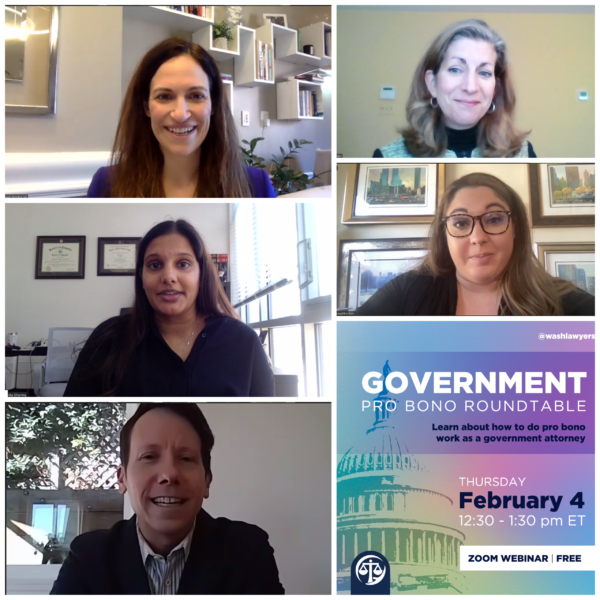
Government Pro Bono Roundtable (2021)
By Shea Hazel
On Thursday, February 4, 2021, Washington Council of Lawyers hosted its annual Government Pro Bono Roundtable. Moderated by Deborah Birnbaum, Assistant General Counsel at the Office of the United States Trade Representative, the discussion captured ways to find pro bono projects; presented legal considerations to avoid conflicts of interest; and, provided encouragement in the vast network of support and mentorship available.
Panelists included Josephine Bahn, FDIC; Andy Doyle, U.S. Department of Justice; Laura Klein, Pro Bono Program Manager, U.S. Department of Justice; and, Prianka Sharma, Office of Advocacy, U.S. Small Business Administration.
Providing Pro Bono in the District
There is a great need for pro bono service in the District, and there are many avenues government attorneys can leverage to provide this service within the scope allowable by their agencies.
Pro bono cases vary in scope, duration, and success. When deciding what types of pro bono cases to engage in, lawyers are encouraged to consider their own interests, skill level, and areas of expertise. Providing pro bono services is manageable when lawyers can tailor schedules to meet their individual and unique needs.
Providers encourage lawyers not to be intimidated, but rather to jump right in. They want repeat volunteers and offer a variety of schedules and opportunities to best enable their volunteers. When seeking opportunities, lawyers are encouraged to remain open-minded and to remember that there is a case for every person. It may be helpful to start with something small to help narrow down the types of pro bono cases you wish to pursue. In A Government Lawyer Keeps Up the Volunteer Habit, longtime volunteer Andrew Doyle shares how the D.C. Bar Pro Bono Program Advice & Referral Clinic is a rewarding way for him to serve others in the District. And if the idea of working with your client remotely is intimidating, Coding Justice Examines Engaging Clients Remotely, offers tremendous insights into meeting clients, where they are and overcoming the challenges engaging clients during a global pandemic, can present.
Mentorship and Support
In the District, there is a shared understanding that pro bono legal advocates work together and help one another. Cases are often shared between co-counsel; supervisors and mentors leading pro bono efforts make themselves available; and, where questions arise, pro bono service providers help to engage experts from across their networks.
Understanding Why Pro Bono Legal Services are Needed
- The D.C. Access to Justice Commission’s Delivering Justice Report highlights the need for representation in all types of cases at D.C. Superior Court.
- Landlord/Tenant Court is just one area of great need for pro bono lawyers. For instance, those caught in the rapid rehousing cycle of evictions need a lawyer to help them stop the cycle. To learn more, read: Rapid Rehousing Program: Implementation Doesn’t Meet Expectations.
Opportunities to Offer Pro Bono Legal Services
Most government agencies (both federal and D.C. government) have pro bono coordinators. If you are interested in taking a case, that should be your first stop. Here are additional resources to help you get started:
- D.C. Bar Pro Bono Center’s Advocacy & Justice Clinic provides cases and mentors.
- Government Pro Bono provides information for Federal government attorneys who want to volunteer.
Professional and Personal Rewards
Providing pro bono legal services allows lawyers to sharpen lawyering skills, gain experience to potentially pivot into other jobs, help people, and overall become better client advocates. A client may just need someone to hear their story and make a phone call on their behalf. Pro bono lawyers don’t have to be subject-matter experts, they just need to be willing to listen and put their training and skills to use on behalf of those in need. Thousands of people each year face critical issues such as housing loss, family instability, and threats to personal safety in D.C. Superior Court without having a lawyer by their side. If you can be that lawyer, you can make a difference.
If you’re excited to take on a pro bono case, Washington Council of Lawyers is here to help. Join Washington Council of Lawyers to connect with volunteer opportunities, share concerns, offer expertise, and continue to expand and enrich your professional network.
Shea Hazel is a law student at UMass Law and a member of Washington Council of Lawyers Advocacy Committee.






